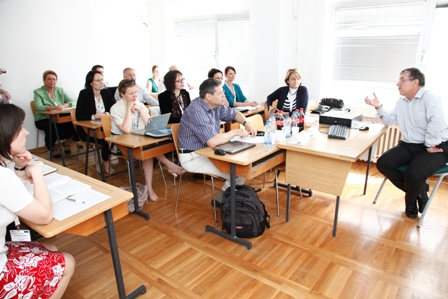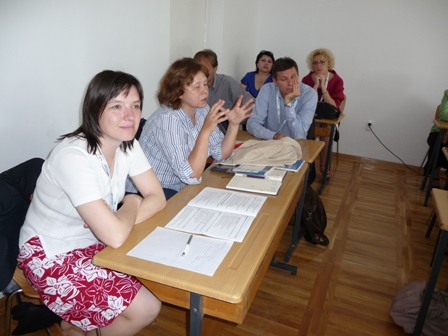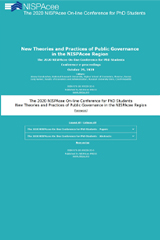| WG_News :: About WG :: Coordinators :: Activities :: WG_outputs |
The topic of the WG is public finance, which plays a vital role in providing essential public services and goods. The WG deals with financial management of existing resources, which includes both microeconomic and macroeconomic dimensions and whose effectiveness is critical for the creation of an enabling environment at all levels for sustainable development. While the extent of transparency and budgetary innovations is long recognised as a factor influencing the quality of public finance management, research in this area in the NISPAcee region is quite scarce. On the other hand, we have huge anecdotic evidence that meaningful changes take place and innovative practices are introduced.
In order to address this challenge, the WG announces these topics for the 2022 annual conference:
The standard structure of the paper:
WG Programme Coordinators:
Place: 29th NISPAcee Annual Conference, Ljubljana, Slovenia
Date: October 21-23, 2021
Main theme of the conference: "Citizens' Engagement and Empowerment - The Era of Collaborative Innovation in Governance"
16 papers were presented in the frame of 5 working group sessions:
The participation of a relatively high number of PhD students is appreciated. The aim of the working group is to deliver research in the area of public finance and public financial management undertaken in the NISPAcee region and to support the publication of original research on the topic. In addition, it also helps to develop research-led policy recommendations on current questions of public finance and public finance management from different aspects at the local, national and international level in the region. While the working group focuses on public finance and public financial management undertaken in the NISPAcee region, we also accommodated two papers dealing with the effectiveness of government regulation, as the interconnected topic. Four papers focused on the impacts of the COVID 19 pandemic, with the focus on local government, public procurement and contactless payment of taxes. Two papers evaluated the transparency of both state budget and local government budgets. The topics of health care financing, procurement, personal income tax and global sovereign debt management and EU funds’ use were also presented.
- Lucie Sedmihradska, Lecturer, Department of Public Finance, University of Economics, Prague, Czech Republic E-mail:sedmih@vse.cz
- Juraj Nemec, Professor of Public Finance and Management, Masaryk University Brno, Czech Republic and Matej Bel University Banska Bystrica, Slovakia, E-mail:juraj.nemec@umb.sk
- Aleksander Aristovnik, Associate Professor, Faculty of Public Administration, University of Ljubljana, Slovenia, E-mail:aleksander.aristovnik@fu.uni-lj.si
While the extent of transparency and participation in the budgeting process has been long recognised as a factor influencing the quality of public finance management, the research in this area in the NISPAcee region is quite scarce. On the other hand, we have huge anecdotic evidence that meaningful changes take place and innovative practices are introduced. In order to fill this gap, the WG announces the following topics for the 2020 annual conference:
1) Local government budget transparency, which addresses research regarding regulation of budget transparency and its development, the extent of compulsory versus voluntary budget information disclosure, the measurement and evaluation of budget transparency or the search for determinants of budget transparency.
2) Participatory budgeting, which explores the introduction and diffusion of participatory budgeting at different government levels, applied models and their adjustment to local needs or circumstances, regulation of participatory budgeting and its development or impact of participatory budgeting on society.
3) Public finance for sustainable development, which includes, amongst others, promoting sound economic, social and environmental policies; ensuring fairness, efficiency and effectiveness of tax systems; strengthening national oversight mechanisms or building the technical, financial and technological capacity of public authorities.
The aim of the working group is to build a network of scholars active in the area of public finance and public financial management and to support the publication of original research undertaken in the NISPAcee region, including special assistance of the WG coordinators to young scholars with limited research and publishing experience. The expected outcome is an edited volume on participatory budgeting, a special journal issue on local government budget transparency and the publication of outstanding papers on public finance for sustainable development in the NISPAcee Journal.
The authors are invited to submit original research papers, i.e. papers presenting the results of their own research. We especially welcome empirical papers providing concrete data and their analysis. The form of the papers is quite open, e.g. single or multiple case studies, comparative papers, survey results or papers applying some statistical analysis.
Requirements for paper submission
•Data and methodology,
•Expected findings.
•Description of the problem studied, showing a good knowledge of the relevant literature in both the local language and in English.
•Short introduction of the country or countries, i.e. present all information necessary (and relevant) to understand your paper.
•Data and methodology described in detail.
•Analysis of the problem.
•Evaluation and policy implications.
•Conclusions and recommendations (this part needs to result from the previous parts of the paper).
WG Programme Coordinators:
Lucie Sedmihradska, Lecturer, Department of Public Finance, University of Economics, Prague, Czech Republic
Juraj Nemec, Professor of Public Finance and Management, Masaryk University Brno, Czech Republic and Matej Bel University Banska Bystrica, Slovakia
Aleksander Aristovnik, Associate Professor, Faculty of Public Administration, University of Ljubljana, Slovenia
Place: 27th NISPAcee Annual Conference, Prague, Czech Republic
Date: May 24-26, 2019
The WG on Public Finance and Public Finance Management focused, during its meeting, on local government financial management, public procurement and impact of grants with 18 papers presented during 5 sessions:
Session 1: Fiscal Federalism
Session 2: State Interventions
Session 3: From Policy Design to Policy Practice in the European Integration Context (ERASMUS+ Jean Monnet Project PRACTIC)
Session 4: Public Procurement and Other
Session 5: Taxation, Budgeting, Spending
In the discussion, participants shared experiences regarding the issues in other NISPAcee countries and also provided recommendations for further improvement of the papers in order to have them published.
In line with the WGs three-year project, we announced two specific research projects for 2020: (1) participatory budgeting and (2) local government budget transparency. As in previous years we will accept all reasonable proposals which comply with the general focus of the WG.
WG Programme Coordinators:
Lucie Sedmihradska, Lecturer, Department of Public Finance, University of Economics, Prague, Czech Republic
Juraj Nemec, Professor of Public Finance and Management, Masaryk University Brno, Czech Republic and Matej Bel University Banska Bystrica, Slovakia
Aleksander Aristovnik, Associate Professor, Faculty of Public Administration, University of Ljubljana, Slovenia
Place: 26th NISPAcee Annual Conference, Iasi, Romania
Date: May 24-26, 2018
The WG on Public Finance and Public Finance Management, during its meeting in Iaşi, mainly focused on two specific research tracks for the 2018 conference:
(1) General track which follows the main theme of the conference – Public Administration for Well-being and Growth, and
(2) Specialised Track: Burning Issue in Local Government Finance in a ‘named’ Country.
In total, 13 papers were presented by researchers from 7 countries (Bulgaria, Czech R., Hungary, Poland, Romania, Slovakia and Slovenia), in one general and two monothematic sessions focusing on Macro Public Finance and Local Government Finance. The presentations and discussions were mainly very interesting and were followed by fruitful discussions between presenter and participants. The WG has also decided to continue in announcing at least two to three research tracks, which will be specialized, accompanied with a research protocol.
The research tracks for the 2019 conference will presumably be:
The WG on Public finance and public finance management during its meeting in Kazan focused mainly on two specific research tracks for the 2017 conference:
(1) Performance financing, and
(2) "Better” government spending as a reaction to the crisis.
In total, 17 papers were presented by researchers from 7 countries (Belarus, Croatia, the Czech Republic, Hungary, Russia, Slovakia and Slovenia), in one general and three monothematic sessions focused on Performance management and outsourcing, Budgeting and corruption, and Intergovernmental fiscal relations and financing development. The presentations and discussions were mainly very interesting and were followed by fruitful discussions among between presenter and participants. The WG has also decided to continue by announcing at least two research tracks, which will be specialised, accompanied by a research protocol.
The research tracks for the 2018 conference will presumably be:
(1) Performance management and budgeting, and
(2) Taxation and tax reforms.
For the next year there will again be an announcement of two research tracks and we will try to encourage comparative research. We plan to invite a third coordinator to the working group: Aleksander Aristovnik from the University of Lubljana.
Comparing to the previous NISPAcee conferences, the final outcome of this year was only about a half of the average number of papers (despite relatively high number of submitted abstracts at the start of the selection process).
Smaller than average number of papers brought two advantages: first, there was more time for presentations and discussion and second, the fact that half of the papers focused on a one concrete topic (pre-announced track on local taxation) allowed interesting comparative sessions.
We organized two sessions dealing with local taxation and tax competition and the Europeanization panel on Public Finances in the EU and EU Associated Countries which dealt with outsourcing in the public sector, microsimulation models in the EU and the burning issue of decentralization in case of Ukraine. The last two papers focused on higher education financing and constructions regulation.
For the next year we plan to announce two research tracks (local taxation and public private interface) and we will try to encourage comparative research.
(1) Local government taxation: Tax autonomy versus tax competition and
(2) "Better” governmental spending as a reaction to the crisis.
We received six papers prepared according to the reserach protocol - three on local taxes and three on public procurement. We also accepted a range of papers focusing on other different public financial management and fiscal policy topics.
In the first section there were presented and substantially discussed three papers dealing with tax competition and it was agreed to continue with this track for the next year. In the framework of the second track - public procurement - one overview paper and two country case studies were presented and a few members of the group expressed interest in this topic for the next year conference.
The rest of sessions discussed mix of papers on different public finance and public financial management topics, for example economic growth, size economies in delivery of local public services, efficiency of foreign loans, privatisation and many others.
Based on discussions we plan to announce at least two specialized research tracks accompanied with a research protocol for 2015 conference (local taxation and public procurement). The research protocols appeared a useful tool in the previous years for not only young scholars in improvement of their researcher and preparation of the paper. At the same time we announce a call for groups of scholars who would like to organize own session in the framework of the WG. It is requested to submit a proposal to the WG coordinators by mid June. The proposal should include short description of the topic, major research questions and a list of interested participants. This sub-group is of course open, but it is meaningful to announce it only in case there are at the at least three definite participants.
The working group first time met on the 21st NISPAcee Annual Conference under new name as the Working Group on Public Finance and Public Financial Management.
The working group is primarily interested in public finance, not econometrics, the coordinators prefer to discuss the benefits or limitations application of these methods in the area of public finance and public financial management.
The WG focused on the following tracks:
-
General track: public finance and public financial management is welcome
- Specialised track: Quantitative methods and public
finance research
For the first time of meeting of the working group were welcomed high quality theoretical studies in general track, but empirical papers providing concrete data and their analysis were the main focus.
For the special track, papers discussing the role of quantitative methods in public finance research were welcomed. It was expected the contents to encourage discussion on how to use quantitative methods in a proper academic manner.


It was a second time of meeting of the Working Group on Fiscal Policy in 2012, in Ohrid, FYROM.




 Price:
Price: 









